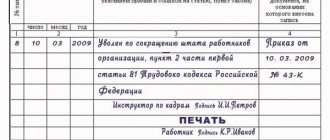When is leave due for a newly hired person?
According to the Labor Code, a person has the right to request leave after 6 months of continuous work in one organization. The duration of rest in this case should be 14 days. By agreement with management, you can leave earlier than the deadline specified in the Labor Code, but the number of vacation days will definitely be individual.
It is worth noting that the above rules apply only to those who work under an employment contract.
If a person works on the basis of any civil agreements, then he must negotiate the terms of his exit independently.
When an employee is entitled to the first vacation at a new job according to the Labor Code of the Russian Federation
This question is answered by the Labor Code. In general cases, a person receives the right to take the first vacation at a new place of work after 6 months
continuous work.
However, it is worth remembering that vacation six months after employment is not guaranteed. Much depends on the organization itself and the employee’s value to it. The employer has the right to refuse leave if, due to operational necessity, he cannot release the employee right now. An organization may have a strict vacation schedule, etc. If a person does not belong to one of the preferential categories, which are granted leave at any convenient time, nothing can be done.
This material was stolen from the site. It happens. Most likely, the stolen version is missing a lot of the information you need. For example, useful links in the article. Visit www.newsment.ru to read the original article and find lots of other useful information!
It is clear that the employer also cannot abuse its right not to allow a person to go on vacation. In the first year of work, vacation must be provided. This means that it should begin, if not six months after getting a job, then no later than 11 months after employment.
There are exceptions to the general rule. The Labor Code allows for going on leave before 6 months after employment by agreement of the parties.
Certain categories of employees can take advantage of the right to the first vacation at a new job at any time. The Labor Code classifies them as follows:
- women who plan to go on maternity leave related to pregnancy and childbirth, or return from it (the maternity leave is increased due to regular leave);
- employees who are under 18 years of age;
- employees who adopted a baby if he was under 3 months old;
- other beneficiaries who are determined by other laws.
Other categories may include, in particular, men whose wives are on maternity leave. This procedure also applies to veterans, military spouses, etc.
Right to first leave
The human right to the first rest is enshrined in the Labor Code. The opportunity to use it appears after six months of working at one workplace. Some organizations refuse to provide a person with rest after six months, citing the fact that this right appears only after 11 months of continuous work. To prove that he is right, a person should refer to legislative acts, namely, Article 122 of the Labor Code of the Russian Federation.
It is recommended to clarify all details with the HR department. It is worth considering that many employers cannot provide a new employee with the opportunity to go on vacation due to the current schedule. Thus, the time to go on vacation depends not only on legislative acts, but also on the situation in a particular organization.
Is it possible to leave early?
There are categories of people who can count on receiving rest regardless of the number of days worked. Among them are:
- minors;
- women who are expecting a child (it is possible to request leave before maternity leave);
- workers who have completed the adoption procedure for an infant under 3 months of age.
Other workers can exercise the right to rest only in accordance with the established procedure. After taking the first vacation, an employee in an organization goes to rest in accordance with the schedule. You can count on 28 days of paid period annually.
How is it paid?
Three days before the start of the vacation, the employer must pay the employee vacation pay. This point is enshrined in Article No. 136 of the Labor Code. Money is issued in person against signature at the company's cash desk or transferred to a bank card.
The amount to be paid is determined by multiplying the average daily earnings by the number of days of rest. Average wages are calculated by dividing annual income by 12 months or the number of days actually worked during the reporting period. Bonuses (annual, quarterly or monthly) are also taken into account.
When calculating vacation pay, travel allowances, sick leave benefits, financial assistance, travel compensation, etc. are not taken into account. Thus, the provision of vacations and their payment are regulated at the legislative level. An employee’s right to rest arises after six months from the date of employment with the company. Further leave can be issued at any time.
If an employee is fired, he is entitled to compensation for unused days off. He also has the right to take a vacation with subsequent termination of the employment contract. Vacation pay is paid three days before the start of the weekend. If an employer violates labor rights, the employee can hold him accountable by contacting the labor inspectorate, the prosecutor's office or the court.
>Is the employer obliged to send an employee on full vacation - 28 days in the first year of work (after 11 months)?
What is indicated in the Labor Code about vacation
The Labor Code is the main act that regulates the rights and obligations of the employee and the employer. It details when a person can count on rest, how long it should last, and in what cases it can be provided ahead of time.
After studying the norms specified in the Code, you can learn more about your rights and responsibilities, including those related to retirement. An employee has the right to refuse a vacation and receive monetary compensation, but this manipulation can be carried out no more than 2 times in a row.
Right or obligation
Going on vacation is considered a human right, since after 6 months of working activity he is not required to go on vacation. However, a person cannot work without long days off for more than 2 years.
If a person cannot begin to rest due to circumstances beyond his control (temporary disability due to injury), then the period can automatically be postponed to the next year. You need to check with the HR department of your work organization about the nuances of rescheduling your annual vacation.
If a person works in hazardous work, he must rest at least once a year. This norm is also enshrined in the Labor Code of the Russian Federation, so the employer must comply with it.
To whom and how is this right granted?
Every worker has the right to rest days, while the employee retains his position and average earnings. This point is clearly explained by Article 21 of the Labor Code of the Russian Federation.
Is any employer obliged to provide an employee with annual rest after 6 months after hiring the person?
Yes, the right to vacation, which arises for an employee after six months of work at a new place, does not depend on the legal form of the employer’s activities (individual entrepreneur, LLC, JSC), on the work schedule and the amount of earnings. Leave is due to all workers without exception, including those who work part-time.
The employer does not have the right to transfer an employee to another workplace or dismissal during vacation, as well as to deprive him of vacation benefits. This point is clearly explained in Article 114 of the Labor Code of the Russian Federation.
Note! There is some nuance. The right to leave is available only to those persons who are officially registered with the company, that is, with the conclusion of an employment contract, a mark in the work book and other norms provided for by Russian legislation, and nothing else.
Agency and civil law contracts do not establish employment relationships and therefore do not guarantee the provision of leave. These types of contracts should not be confused with an employment contract. In exceptional cases, agency and civil law contracts may be recognized as employment contracts. Accordingly, in this case they will have all the guarantees that are provided for employees of the Labor Code of the Russian Federation.
How many days are due after 11 months?
To calculate the number of allotted days, take the indicator 2.33. Thus, those who worked for 11 months are entitled to 25-26 days (2.33 * 11).
In the future, every year a person gets the opportunity to rest for 28 days. If desired, by agreement, you can go on vacation 2 times a year for 2 weeks. You can divide the available days in the most suitable way for yourself, but one of the parts must be at least 14 days.
Before starting to rest, a person will need to perform a number of specific actions. If you follow all the rules, you will be able to go on vacation as planned without any problems.
When is a new employee added to the vacation schedule?
The employee is included in the vacation schedule upon his employment. In this case, the schedule is formed no later than 14 days before the new year.
The schedule is approved by the director of the company after the schedule is fully drawn up by an HR department specialist or HR employee.
This point is explained by Article 123 of the Labor Code of the Russian Federation. The form that is used for this is called Form T-7.
Submission rules
As a rule, going on vacation includes the following stages:
- Drawing up an application by the employee 2 weeks before the required release date (the paper is drawn up in free form). You should also first familiarize yourself with the vacation schedule and verbally clarify available dates.
- The head of the department signs the application and sends it to the employer.
- If the employer agrees that the person should go on vacation, he forwards the application to the human resources department.
- An order is issued for a person to go on vacation.
- The accounting department pays vacation pay according to the order.
The order specifies the duration of the vacation, as well as the amount of vacation pay. The employee reads the order and signs it.
Among the basic rules for providing well-deserved rest are:
employees of the organization, part-time workers and seasonal workers can count on vacation;- certain categories of employees are granted extended basic leave (the number of days exceeds 28);
- for employees who work in the far north or hazardous production conditions, additional leave is provided during the working year.
Certain categories that can count on extending their basic rest include the elderly, disabled people, teachers, police officers, doctors, and rescue workers.
In accordance with Art. 122 of the Labor Code of the Russian Federation, paid leave must be provided to the employee annually and in accordance with Part 4 of Art. 124 of the Labor Code of the Russian Federation prohibits failure to provide annual paid leave for two years in a row.
Is it compulsory to grant leave for the first time no later than 11 months of work? Is it possible, at the request of an employee, to provide the employee with annual paid leave for the first time, for example after 13 or 15 months?
Paid leave of full duration must be provided to the employee in each working year (part one of Article 122 of the Labor Code of the Russian Federation, clause 1 of the Rules on regular and additional leaves, approved by the People's Commissariat of Labor of the USSR on April 30, 1930 N 169, hereinafter referred to as the Rules). The first working year begins on the day of hiring for a given employer and ends after 12 months, included in the length of service giving the right to leave. The next working year begins immediately after the end of the previous one (see also letter of Rostrud dated December 8, 2008 N 2742-6-1). The right to use vacation for the first year of work arises for the employee after six months of continuous work with this employer (part two of Article 122 of the Labor Code of the Russian Federation). Certain categories of workers listed in part three of Art. 122 of the Labor Code of the Russian Federation, according to their application, annual paid leave is provided in the first 6 months of the working year. Thus, leave for the first working year must be granted to the employee in the second six months of this working year.
Please note that the Labor Code of the Russian Federation does not require agreeing on a specific vacation date with each employee. The order of provision of paid vacations is determined annually in accordance with the vacation schedule approved by the employer (part one of Article 123 of the Labor Code of the Russian Federation). New employees hired in the first half of the year should be included in the vacation schedule approved for the current calendar year, since their right to annual paid leave will arise this year (part two of Article 122 of the Labor Code of the Russian Federation). The vacation schedule drawn up and approved by the employer in accordance with part two of Art. 123 of the Labor Code of the Russian Federation is mandatory for both the employer and the employee.
In other words, according to the law, the employee cannot determine the period of use of the vacation; he must go on vacation exactly within the time period established by the schedule (no later than the end of the first working year), and the employer has the right to refuse to provide him with vacation at a time other than that provided for in the vacation schedule. . If an employee does not want to go on vacation according to the schedule, but he is promptly familiarized with the order for granting vacation and the vacation is paid on time (part three of Article 123, part nine of Article 136 of the Labor Code of the Russian Federation), then he has no reason to refuse to use it. The employer has the right not to allow the employee to work during the period of the scheduled vacation. An employee who goes to work contrary to the vacation schedule may be subject to disciplinary action.
In conclusion, we note that in exceptional cases due to production needs, it is possible to transfer the vacation to the next working year with the consent of the employee; in this case, the leave must be used no later than 12 months after the end of the working year for which it is provided (part three of Article 124 of the Labor Code of the Russian Federation). When an employee himself takes the initiative to postpone the vacation, then vacation for the first working year can be granted to him after 13 or 15 months of work, for this he must write a statement about this. After the employer receives the corresponding application from the employee, an order is drawn up to postpone the vacation in any form, which indicates the reasons for the transfer and the new period of vacation. This document serves as the basis for making changes to the vacation schedule (see, for example, instructions for filling out form N T-7, approved by Resolution of the State Statistics Committee of the Russian Federation dated January 5, 2004 N 1).
Prepared answer:
Expert of the Legal Consulting Service GARANT
Member of the Chamber of Tax Consultants Morozov Ivan
Information legal support GARANT
https://www.garant.ru
How does payment work?
The amount of vacation pay is determined based on the average salary for the position. To find out the exact amount, special formulas are used. You first need to know the timing of the billing period and the amount of average daily earnings.
Vacation pay is paid to the employee before the start of the vacation. The deadline is no later than 3 days before the start of the vacation. It is worth noting that when calculating vacation pay, not only average earnings are taken into account, but also the amount of bonuses received during the billing period. Previously received bonuses may increase your payout.
When calculating payments, the legislative norms specified in the Labor Code of the Russian Federation must be taken into account. Money can be given in the form of cash or non-cash by transfer to a card. After receiving vacation pay within the specified period, the person begins to rest.
Watch the video about the right to leave:
How is leave provided to employees?
Leave is provided to employees as standard. According to Article No. 123 of the Labor Code, every year the management of the enterprise must develop a vacation schedule, taking into account the opinion of the trade union organization.
Such a document should be approved no later than two weeks before the start of the new calendar year. Two weeks before sending a subordinate on vacation in accordance with the schedule, the employer is obliged to notify him of the start date of the vacation.
This is done in writing. The employee must confirm the fact of familiarization with the information and consent to go on leave with a personal signature. Certain difficulties and questions arise when arranging vacation days for a recently hired subordinate. Let's say an employee decides to take his first vacation after starting a job in 11 months.
To do this, he should write a corresponding application and submit it to his superiors for consideration. If the request is approved, the director of the company will put a conciliation resolution on the document and send it to work. Based on the application, an order will be prepared.
After reading, the head of the company will put his signature on the order, thereby approving the publication of the document. Then the employee is introduced to the order against signature. After this, the employee can take his first well-deserved leave at the enterprise on the specified dates.
Typically, companies publish a vacation schedule on December 15-17. This document provides the start and end dates of the next rest days for all employees of the enterprise.
Can an employer not allow you to rest?
The employer’s right not to let a person go on vacation depends on the type of vacation in question. An employee has the right to paid rest once a year, even if he got a job for the first time. However, the specific period for going on vacation is determined in accordance with the schedule in the organization, therefore, after submitting an application, the employer can offer a vacation only after 1-2 months.
If the provision of vacation will negatively affect the work of the enterprise, the employer can agree with the employee to postpone the vacation to the next year. Very often, vacation schedules are determined during oral negotiations. All employees are discussed with each other about which date would be most preferable for them.
If an employee meets all the conditions for the provision of rest, but the employer denies the right without explanation, then to protect his interests you can contact the following organizations:
- state labor inspectorate;
- trade union;
- district court at the place of residence.
It is recommended that all disputes be resolved orally. Vacations should always be planned in advance, regardless of the length of service at the new place.
Labor Code on the provision of vacation days
By law, every employee has the right to vacation. The provision of days off is regulated by the Labor Code of the Russian Federation (LC). This legal document came into force on December 30, 2001.
Since then, many changes have been made to it. Chapter 19 of the Labor Code of the Russian Federation is devoted to vacation issues. It is important for employers to familiarize themselves with the provisions of this regulatory act and follow them when arranging vacation days for their subordinates.
Employees also need to know their rights. Article 114 states that basic holidays are provided to employees annually. During the period of vacation, the employee retains his average earnings, workplace and position. The duration of the main paid leave is enshrined in Article No. 115 of the Labor Code of the Russian Federation. According to it, employees are provided with at least 28 calendar vacation days.
It is also noted that certain categories of employees are entitled by law to extended additional rest. Annual additional leave is discussed in articles No. 117-119. Such days off are paid and are provided to employees with an irregular schedule, to persons working in dangerous and harmful conditions, for the special nature of their production activities.
The duration of additional leave for different groups of employees differs and can be increased in the local regulations of the enterprise. Articles No. 120-121 of the Labor Code of the Russian Federation are devoted to the peculiarities of calculating the duration of paid vacations.
Information is provided on what length of service entitles you to a period of rest. The possibility of extending or transferring vacation days is enshrined in Article No. 124.
It describes situations that give the employee the right to change the rest dates approved by the schedule. In accordance with Article No. 125 of the Labor Code, it is not necessary to use all weekend days at once: you can divide them into parts, taking into account that one of them will be at least two weeks. Recall from leave at the initiative of the employer must occur in accordance with established rules.
They are also given in this article. If an employee does not want to go on vacation and demands that the company management pay him monetary compensation instead of rest, then the employer should be guided by Article No. 126 of the Labor Code of the Russian Federation. Thus, the 28 days allocated for rest are not subject to financial replacement.
When terminating an employment relationship with an employee, it is important to remember that he has the right to vacation followed by dismissal or financial compensation for unused days off. This point is approved by Article No. 127. Article No. 128 of the Labor Code is devoted to administrative leaves and time off.
Legal literacy will help the employee, if necessary, defend his rights, and prevent them from being infringed by the company administration in the future.
Is it permissible for an employer to share vacation without the person’s consent?
Some employers force a person to divide their vacation into several parts, however, according to the Labor Code of the Russian Federation, such a procedure can only be performed by mutual consent. If a person does not want to take leave for a limited period of time, he should insist that he be given a full 28 days' rest.
If the employer constantly violates the rights of the employee, you should contact the supervisory or inspection authorities. You can appeal against unlawful actions of an employer to the state labor inspectorate.
Common Mistakes
The submission procedure in some organizations is accompanied by many errors. If the procedure for granting rest is structured incorrectly, then after the employee submits the application, it can be considered within a month, and an order to leave can be issued 1 day before it begins.
Among the most common mistakes are:
- indication in the order instead of the work period of a calendar year;
- lack of a vacation schedule in the organization;
- lack of notification to the employee about going on vacation (the organization must notify the worker 2 weeks before the start of the vacation);
- dividing the holiday into parts without agreement.
If the company does not notify the person, then he does not have time to submit a request for vacation pay in time. Because of this, he has problems with accounting.
To ensure that the HR department does not make mistakes when drawing up an order, it is necessary to use standardized samples. When calculating individual indicators, it is necessary to use formulas that are regulated by law. By using them, the likelihood of making an error will be significantly reduced.
Is it possible to go on vacation at a time convenient for you?
For ordinary workers, the only way to go on vacation at the right time is through early arrangements. When drawing up a schedule, it is necessary to discuss in advance with management and colleagues who will go on vacation and during what period.
Employees who have been recalled from their previous rest period can begin resting at any time. If, due to unforeseen circumstances, the organization requires workers, then management may ask the person to come to work. In the future, he will have the opportunity to choose any date for his vacation. It is worth noting that pregnant women and people who work in hazardous work cannot be recalled from vacation.
Knowing when you can count on rest and how long it should last helps a person in everyday work life. The rules apply to absolutely all organizations that hire workers under an employment contract. If a worker’s rights are violated, they must be defended by appealing to the labor inspectorate or district court.
Top
Write your question in the form below
Enter the site
RSS Print
Category : Labor legislation Replies : 8
You can add a topic to your favorites list and subscribe to email notifications.
« First ← Prev.1 Next → Latest (1) »
| arhimila |
| Please help me figure it out! I work for the government. distribution enterprise from 01.08.2011 Recently a vacation schedule was drawn up and I got the month of September (I tried to object, but I was told that my female colleagues, who have one child each, have privileges and go on vacation in July and August). This is the first time I’ve heard something about this. , but agreed to September and signed it as a vacation order (which the timekeeper brings). So the question is: can I go on vacation in July? |
| I want to draw the moderator's attention to this message because: Notification is being sent... |
| Allegra" [email hidden] , Wrote 26284 messages Write a private message Reputation: 3478 | #2[332547] December 11, 2011, 9:02 |
Quote:
Article 170. Annual provision of labor leave.
Exceptional cases of transferring labor leave to the next year The employer is obliged to provide the employee with labor leave, as a rule, during each working year
(annually).
In exceptional cases, when the provision of full labor leave to an employee in the current working year may adversely affect the normal activities of an organization or individual entrepreneur, it is allowed, with the consent of the employee, to transfer part of the vacation to the next working year. The remaining part of the labor leave cannot be less than fourteen calendar days and is granted until the end of the current working year.
The transferred part of the labor leave, at the request of the employee, is added to the leave for the next working year or used separately. It is prohibited to refuse to provide labor leave to employees under eighteen years of age and to employees who have the right to additional leave due to harmful and (or) dangerous working conditions.
The working year is equal in length to the calendar year, but is calculated not from January 1, but from the date of hiring (in your case - from 08/01/2011). The employer committed a violation. Your working year is calculated from 08/01/2011 to 07/31/2011, and within this period the employer was obliged to plan
your vacation.
And only in an exceptional case (which can be said to exist only when it occurs, and not to predict it when drawing up a vacation schedule), the employer (and then with the consent of the employee!!!)
can provide the employee not with a full vacation, but only its part lasting at least 14 days. If the employee objects to such provision, the employer is obliged to provide the vacation in full, regardless of how the vacation will affect the situation, “And let the whole world wait! (With). (NB: Although 99.99 percent of 100 employees agree to separation and transfer, the rational instinct of self-preservation still kicks in). Female colleagues who have one child each (I deliberately turn a blind eye to the philological and physiological inconsistency in this definition) may have the privilege to choose the time of their vacation only in accordance with Art. 168 Labor Code:
Quote:
Article 168. The order of granting labor leaves The order of granting labor leaves is established for a collective of workers by a labor leave schedule approved by the employer in agreement with the trade union, or by the employer in agreement with the employee in the absence of a trade union.
The labor leave schedule is drawn up for the calendar year no later than January 5 or another date established by the collective bargaining agreement, agreement or agreed upon by the employer with the trade union, and is brought to the attention of all employees. The start date of the labor leave is determined by agreement between the employee and the employer. When drawing up a vacation schedule, the employer is obliged
to schedule vacation at the request of the employee:
in the summer or other convenient time:
1) for persons under eighteen years of age;2) veterans of the Great Patriotic War and veterans of military operations on the territory of other states; 3) women who have two or more children under the age of fourteen or a disabled child under the age of eighteen; 4) workers who became ill and suffered radiation sickness caused by the consequences of the disaster at the Chernobyl nuclear power plant and other radiation accidents; 5) employees who are disabled, for whom a causal connection has been established between injury or disease leading to disability and the disaster at the Chernobyl nuclear power plant; 6) participants in the liquidation of the consequences of the disaster at the Chernobyl nuclear power plant; 7) workers evacuated, resettled, who independently left the territory of radioactive contamination from the evacuation (exclusion) zone, the priority resettlement zone and the subsequent resettlement zone, with the exception of those who arrived in these zones after January 1, 1990; donors who have been issued the signs “Honorary Donor of the Republic of Belarus”, “Honorary Donor of the USSR”, “Honorary Donor of the Red Cross Society of the BSSR”;
9) in other cases provided for by a collective or labor agreement; in a certain period:
1) employees studying in evening schools and institutions providing vocational, secondary special, higher and postgraduate education, in evening and correspondence forms of education - before or during the period of passing the current and final certification, passing candidate's exams, as well as during holidays at an educational institution; 2) employees whose wives are on maternity leave - during the period of this leave; 3) for those working part-time – simultaneously with leave for their main job; 4) teachers (teachers) of general education institutions and institutions providing vocational, secondary special, higher and postgraduate education, special educational institutions, special educational institutions, specialized industrial training institutions - in the summer; 5) women before or after maternity leave; 6) working wives (husbands) of military personnel - simultaneously with the vacation of their husbands (wives).
You most likely signed a vacation schedule for the next year, drawn up - apparently - in agreement with you (you were presented with a fait accompli, you agreed). Now, most likely, your employer will not let you go on vacation in July. But: You have the right to contact the labor dispute commission (if there is one in your organization), for example, with a complaint that you were scheduled for a vacation in violation of the law. Or to the labor inspectorate.
I want to draw the moderator's attention to this message because:Notification is being sent...
I do not give advice in private messages. Please ask all questions on the forum.| arhimila [email hidden] Wrote 7 messages Write a private message Reputation: | #3[332550] December 11, 2011, 12:11 |
Notification is being sent...
| Allegra" [email hidden] , Wrote 26284 messages Write a private message Reputation: 3478 | #4[332553] December 11, 2011, 12:40 |
Notification is being sent...
I do not give advice in private messages. Please ask all questions on the forum.| arhimila [email hidden] Wrote 7 messages Write a private message Reputation: | #5[332562] December 11, 2011, 15:27 |
Notification is being sent...
| Allegra" [email hidden] , Wrote 26284 messages Write a private message Reputation: 3478 | #6[332563] December 11, 2011, 15:37 |
arhimila wrote:
...may I be sent on vacation not in July (as I want), but for example, in May or June, or even after six months of work, i.e. from February? ...
You understand correctly.
arhimila wrote:
But if they went last year also in the summer, can I at least on this basis demand a summer month (namely July)?
The list of categories of employees who may require planning leave at a certain time, and the employer is obliged to plan leave for them at this time, is given above.
I want to draw the moderator's attention to this message because:Notification is being sent...
I do not give advice in private messages. Please ask all questions on the forum.| yulia_211 [email hidden] Belarus, Minsk Wrote 104 messages Write a private message Reputation: | #7[474278] December 12, 2014, 2:20 pm |
Notification is being sent...
| yulia_211 [email hidden] Belarus, Minsk Wrote 104 messages Write a private message Reputation: | #8[474279] December 12, 2014, 2:22 pm |
Notification is being sent...
| m1958-8 [email hidden] Belarus, Minsk Wrote 10371 messages Write a private message Reputation: 1224 | #9[474281] December 12, 2014, 2:24 pm |
in the employee's current working year. Cases of provision in the next working year are exceptional:
I want to draw the moderator's attention to this message because:Quote:
Article 170. Annual provision of labor leave.
Exceptional cases of transferring labor leave to the next year In exceptional cases, when the provision of full labor leave to an employee in the current working year may adversely affect the normal activities of the organization
or individual entrepreneur, it is allowed, with the consent of the employee, to transfer part of the leave to the next working year.
Notification is being sent...
« First ← Prev.1 Next → Latest (1) »
In order to reply to this topic, you must log in or register.
 2) veterans of the Great Patriotic War and veterans of military operations on the territory of other states; 3) women who have two or more children under the age of fourteen or a disabled child under the age of eighteen; 4) workers who became ill and suffered radiation sickness caused by the consequences of the disaster at the Chernobyl nuclear power plant and other radiation accidents; 5) employees who are disabled, for whom a causal connection has been established between injury or disease leading to disability and the disaster at the Chernobyl nuclear power plant; 6) participants in the liquidation of the consequences of the disaster at the Chernobyl nuclear power plant; 7) workers evacuated, resettled, who independently left the territory of radioactive contamination from the evacuation (exclusion) zone, the priority resettlement zone and the subsequent resettlement zone, with the exception of those who arrived in these zones after January 1, 1990; donors who have been issued the signs “Honorary Donor of the Republic of Belarus”, “Honorary Donor of the USSR”, “Honorary Donor of the Red Cross Society of the BSSR”;
2) veterans of the Great Patriotic War and veterans of military operations on the territory of other states; 3) women who have two or more children under the age of fourteen or a disabled child under the age of eighteen; 4) workers who became ill and suffered radiation sickness caused by the consequences of the disaster at the Chernobyl nuclear power plant and other radiation accidents; 5) employees who are disabled, for whom a causal connection has been established between injury or disease leading to disability and the disaster at the Chernobyl nuclear power plant; 6) participants in the liquidation of the consequences of the disaster at the Chernobyl nuclear power plant; 7) workers evacuated, resettled, who independently left the territory of radioactive contamination from the evacuation (exclusion) zone, the priority resettlement zone and the subsequent resettlement zone, with the exception of those who arrived in these zones after January 1, 1990; donors who have been issued the signs “Honorary Donor of the Republic of Belarus”, “Honorary Donor of the USSR”, “Honorary Donor of the Red Cross Society of the BSSR”;









